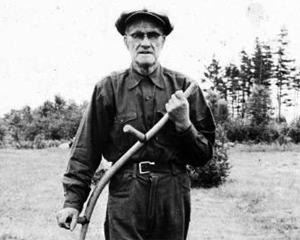
Sung by Malcolm Angus MacLeod of Skir Dhu, whose own ancestors came from the Isle of Harris. The song was composed by Dr. George Murray, a native of the Isle of Lewis and a minister in Canada and the United States. He wrote it for a fellow clergyman, Rev. Donald Gillies, who was brought up in St. Kilda.
Tuireadh Nan Hiortach. Malcolm Angus MacLeod. T-250. Beaton Institute, Cape Breton University.
Artist
Malcolm Angus MacLeod
Lyrics
Tuireadh Nan Hiortach
Tha sinne brònach ‘s is beag an t-iongnadh,
Is tha sinn cianail an diugh air fògradh;
Tha ‘n cuan an iar le chuid thonnan fiadhaich
Gar sgaradh cian bho ar n-àite còmhnaidh.
Tha sinn mar chaoraich an seo gun bhuachaill,
‘S sinn sgapt’ measg sluaigh air nach eil sinn eòlach;
Ach ‘s tric ar smuaintean ri snàmh nan cuantan
Do eilean uaine nan cluaintean bòidheach.
Tha Hiort nam fuaran ‘s nan sgeirean gruamach
Am meadhan cuain ‘s chan eil duine beò ann;
Na h-eòin mun cuiart air ri gabhail uamhais,
On dh’fhalbh an sluagh a bh’ann uair a’ còmhnaidh.
Na taighean blàth’ anns an cluinnte Ghàidhlig.
Thèid iad ‘n an càirntean ‘s bidh tàmh aig eòin annt’;
Cha bhi am buachaill le chù ‘s le chuaille
Nas mò gam fuadach le fuaim a chòmhraidh.
Tha ‘n eaglais fuar ‘s chan eil clag ga bhualadh,
Cha tional sluagh ann air madainn Dòmhnaich;
Cha chluinnear seinn ann am fuaim an aoibhneis,
Tha ‘n tìr ri caoidh chionn nach tìll na seòid ud.
Cha b’e gu h-àraidh a dhol thar sàile
Chuir sinn fo àmhghair ‘s a dh’fhàg sinn brònach;
Ach mar a sgaoileadh air feadh gach taobh sinn,
‘S nach fhaic sinn aon air a bheil sinn eòlach.
Ged tha an sluagh measg a bheil sinn truasail,
Tha ‘n cànan cruaidh ‘s tha iad fuar ‘n an dòighean;
‘S ann bha sinn suaimhneach far ‘n thogadh suas sinn,
Le Gàidhlig uasal ga luaidh an còmhnaidh.
An uair bhiodh àmhghair aig neach ‘s an àite,
Gach duine chàch bhiodh le bàigh ga chòmhnadh;
Chan fhaighte gamhlas ‘n am measg, na aimhreit,
‘S e sud na glinn anns nach cluinnte fòirneart.
Tha sinne cràiteach on rinn sinn fhàgail,
Chan e gu h-àraidh gun d’fhàg sinn stòras;
‘S e chuir fo phràmh sinn na tha d’ ar càirdean
‘N an laighe sàmhach ‘s iad càirt’ fon fhòd ann.
Soraidh slàn leibh gun teich na sgàilean,
Far bheil sibh tàmh cha bhi càch nur còir ann;
Tha sibh-se sìnt’ anns an tìr bu mhiann leibh,
Is eòin ri sgriachail mu’r n-àite còmhnaidh.
Mun cuairt don àite sa bheil sibh càirte,
Cha chruinnich càirdean ‘s cha shilear deòirean;
Bidh ur n-uaighean ‘n an tulaich uaine,
Bidh feur gun bhuain orr’ ‘s an sluagh air fògradh.
‘S e sgur de m’òran is iomchaidh dhòmh-sa,
Le briathran beòil meud mo bhròin chan ìnnsear;
Ceud soraidh slàn leat o eilein ghràdhaich,
Far ‘n deachaidh m’àrach ‘s bheil tàmh mo shìnnsre.
Translation:
Lament for the St. Kildans
We are sad and it’s little wonder
We are homesick today in exile;
The western ocean with its wild waves
Is parting us far from our dwelling-place.
We are here like sheep without a shepherd,
Scattered among people with whom we are not familiar;
But often our thoughts swim across the oceans
To the green island with the beautiful meadows.
St. Kilda of the springs and the grim rocks
Is in the middle of an ocean with no living person there;
The birds around it are in dread
Since the departure of the people who lived there.
The warm houses where Gaelic was heard
Will become cairns where birds will rest;
The shepherd with his crook will no longer
Chase them away with the sound of his voice.
The church is cold and the bell is not being rung,
People will not gather there on a Sunday morning;
No singing or sound of joy is heard there;
The land is in mourning because those heroes will not return.
It was not going overseas, particularly,
That left us in distress and saddened;
But how we were scattered on all sides,
And that we cannot see anyone we know.
Though the people with whom we live are sympathetic,
Their language is shrill and they are cold in their ways;
We were tranquil where we were brought up,
Speaking the noble Gaelic constantly.
When any person in the place was in distress
Every other person would help him with kindness;
There was no jealousy or conflict among them;
These were the glens where oppression was never voiced.
We are in pain since our departure;
Not especially because we left valuable possessions;
What made us dejected was the many friends
Who lie there silently under the sods.
Farewell forever to you until the shadows flee away;
Others will not be near your resting-place;
You are buried in the land of your desire,
With the birds screeching around your place of repose.
Around the place where you are buried
Friends will not meet and tears will not be shed;
Your graves will be green mounds,
The grass will be uncut since the people have been evicted.
It is proper that I should conclude my song,
The extent of my sorrow cannot be expressed in words;
One hundred last farewells to you, oh dear island,
Where I was reared and where my forebears dwell.
Materials
Materials
Links
Links
- Cape Breton’s Magazine: The Future of Gaelic on Cape Breton
- Cape Breton Regional Library: Leugh Seo Catalogue
- Gaelic College of Celtic Arts and Crafts
- The Gaelic Council of Nova Scotia
- MacEdward Leach: The Songs of Cape Breton
- St. F.X. Gaelstream: Cape Breton Gaelic Folklore Collection
- Virtual Museum Canada: A Cape Breton Céilidh